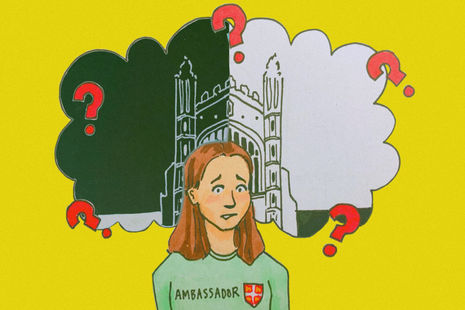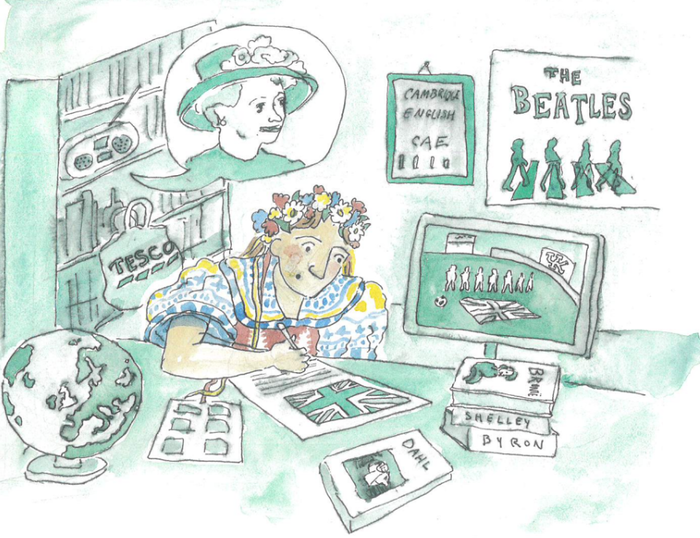The lies we tell prospective students
Martha Rayner reflects on the half-truths of college outreach

It was barely two days into my week of paid outreach for Queens’ College when it emerged that a racial slur was used at a Peterhouse JCR pub quiz.
The story shocked me for one reason in particular: not that such an event occured, as sadly this is all too common, especially in institutions like Oxbridge. Instead, it struck me that those I was surrounded with were particularly unsurprised it had occurred at Peterhouse, describing it as the Cambridge counterpart to ‘Toriel’.
“It felt deeply dishonest to glaze over this information”
Whether I was not as well versed in college stereotypes as I had imagined, or these claims were simply grounded in anecdotes referencing a conservative history that has long departed, it created a sense of unease. We had been told to avoid sharing negative stereotypes about other colleges to students. After all, we were meant to be visiting schools, explaining what Cambridge life was like and why students should apply. Yet, when confronted with this evidence it felt deeply dishonest to glaze over this information.
Throughout the week, we kept returning to the question of how to present Cambridge. We often found ourselves self-censoring to project a balanced, equitable image of the university and its admissions system.
Was it fair to tell students it doesn’t matter which college they apply to? Should we say to “just be confident” when asked about interviews?
Often these answers are double edged. Admissions teams cannot technically claim applicants have equal chances at every college given the pooling system’s imperfections, nor would many students deny there were not notably different college cultures, particularly when colleges like Trinity have a disproportionately high intake of privately-educated students. Confidence helps, and whilst many reserved students thrive, pretending it doesn’t matter at all might do them a disservice when they are up against those who have had school environments that foster public speaking. Ultimately, it is risky to place full faith in this system to recognise applicants’ potential.
Striking the balance between making the University look accessible and not downplaying the high expectations is tough. Some Year 10s confidently explained what supercurriculars were, clearly trained for university, while others looked at us blankly, having written off Cambridge already.
On occasion, teachers even waited until students were out of earshot to voice concerns that their students struggled to express thoughts academically, or that past applicants from state schools had felt ostracised. They understood the tightrope we were walking: a duty to represent the university, but also a desire to be honest.
“Outreach often means skimming over these realities in the hope things will change”
Even the contrast within schools was stark, exacerbated further by the differences amongst ourselves. We weren’t quite a Breakfast Club ensemble, but often boys’ grammar students would direct questions to the guys, clearly drawn to a ‘lad’ party culture. Female students often gravitated toward the girls. There was a palpable divide within the spaces we visited, sometimes students chose to completely segregate the side of the class they sat on by gender. The recent release of Netflix’s Adolescence made these dynamics feel all the more worrying.
Within Cambridge there are still some traditions and spaces that uphold exclusionary attitudes – the long documented behaviour of drinking societies, for instance, where incidents of gross entitlement and discrimination rear their head. The culture is not fully inclusive yet. Outreach often means skimming over these realities in the hope things will change – that what should be will eventually become what is.
However, this should not reduce outreach to dishonesty. Words may ring slightly empty but are the first step to action.
The problems plaguing the University’s reputation are not unique – the same and worse is found at other top institutions – but their solutions will be specific to Cambridge. The University’s vast financial resources are rightly criticised, but they also enable support systems, such as the Cambridge bursary. Many students are not even aware of the scheme, or their eligibility for it, until told they are receiving money. College extracurricular grants often allow students to claim hundreds for travel and their sporting and musical pursuits. The foundation year in Arts, Humanities and Social Sciences bridges the gap for those who have experienced educational disadvantage. Projects with real world impact like End Everyday Racism, developed by Sociology department members, show a commitment to making spaces more inclusive at the University.
There are a myriad of positive experiences to draw from, stories that don’t erase Cambridge’s problems but instead add complexity. One of these is having seen the lengths my college outreach team goes to both support prospective students and students working in outreach roles.
As a year 10 student still naively dreaming about Hogwarts, I know I would have been hanging on to the every word of a Cambridge student – what we say to students does matter. While we cannot immediately fix dynamics in schools nor provide false promises for those in Cambridge, we can hope that by showing this range, students can make informed decisions and, hopefully, believe Cambridge is not only a place to study, but a place to belong.
 News / Colleges charge different rents for the same Castle Street accommodation2 March 2026
News / Colleges charge different rents for the same Castle Street accommodation2 March 2026 News / News in Brief: waterworks, wine woes, and workplace wins 1 March 2026
News / News in Brief: waterworks, wine woes, and workplace wins 1 March 2026 News / Climate activists protest for ‘ethical careers policy’1 March 2026
News / Climate activists protest for ‘ethical careers policy’1 March 2026 News / Angela Merkel among Cambridge honorary degree nominees27 February 2026
News / Angela Merkel among Cambridge honorary degree nominees27 February 2026 News / Private school teacher who lied about Cambridge degree barred from teaching27 February 2026
News / Private school teacher who lied about Cambridge degree barred from teaching27 February 2026









